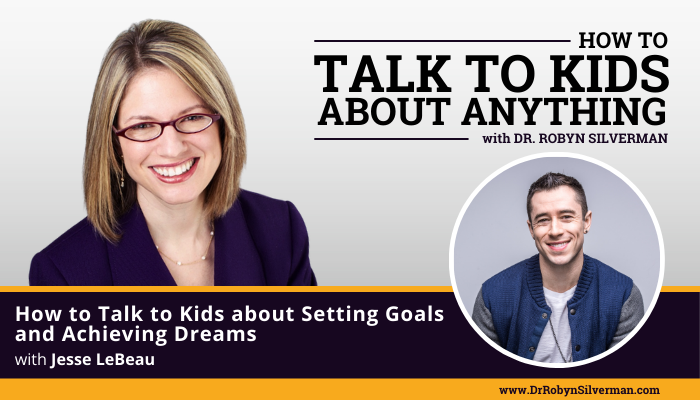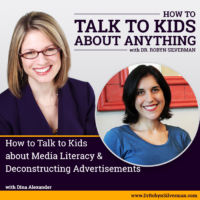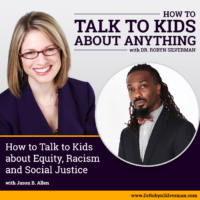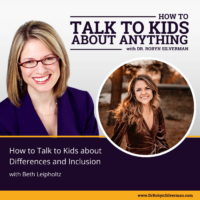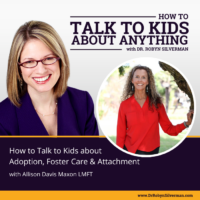Podcast: Play in new window | Download
Subscribe: Apple Podcasts | RSS | More
How to Talk to Kids about Good Manners
This podcast episode delves into the importance of discussing with our children about setting their goals and working towards achieving their dreams. Dr. Robyn was joined by Jesse LeBeau, renowned as “The Celebrity Teen Coach” and a motivational speaker, as they talked into this subject.
INTRODUCTION:
We know that setting goals and adjusting our daily attitude, our vital ingredients for dream fulfillment. For our young people these days, they need to use their unique set of skills, work their hardest, find some of this balance between what they truly want and what they’re required to do to get through school and have friends and navigate life. Once we do all that, everything is bound to go just as planned, right? Well, not exactly what if everything doesn’t go your way? How do you keep going when the odds are stock stacked against you and you keep falling short? Can we really achieve our dreams, even if we are the proverbial underdog? For this conversation, I will be talking together with Jesse LeBeau.
Bio:
Jesse LeBeau is one of today’s most highly sought-after youth motivational speakers, authors, and motivators. His unlikely underdog story has inspired millions of teens through his speaking, best-selling books, one of which is called Among the Giants, and he also has inspired people through his youth programs. He is one of the world’s premiere basketball trick artists and is regularly featured on TV, film, and international tours. Jesse’s new reality series ‘The LeBeau Show’ allows viewers the chance to follow him around the country and see firsthand the major impact he is having on youth, particularly teens who are struggling. In 2017, he started THE ATTITUDE IS EVERYTHING FOUNDATION as a resource for young people to have ongoing support throughout their difficult teenage years particularly targeting the area of self-esteem, confidence, and mental health.
Important Messages:
- Finding Your Passion
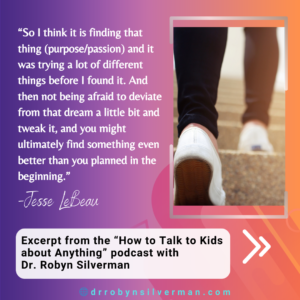 & Purpose: Finding your passion and finding your purpose, and for me, that was always basketball growing up. I grew up on a little island in Alaska and I was just in love with basketball and I wanted to be a basketball player. And so that was the thing that got me up early and got me taking the boat to school early so that I could practice. And I always had this dream of being an NBA basketball player. And it didn’t work out because I’m five foot seven and not good enough to be in the NBA unfortunately. But I was able to do a lot with basketball and eventually, I was traveling around the world playing basketball with Allen Iverson, and we came back to my hometown and people lined up after the game. I knew a lot of these kids, parents, and older brothers and sisters, being from a small town in Alaska. And really that was a light bulb moment for me that I could use basketball as a hook and as a tool to capture kids’ attention, and then I could share my story.
& Purpose: Finding your passion and finding your purpose, and for me, that was always basketball growing up. I grew up on a little island in Alaska and I was just in love with basketball and I wanted to be a basketball player. And so that was the thing that got me up early and got me taking the boat to school early so that I could practice. And I always had this dream of being an NBA basketball player. And it didn’t work out because I’m five foot seven and not good enough to be in the NBA unfortunately. But I was able to do a lot with basketball and eventually, I was traveling around the world playing basketball with Allen Iverson, and we came back to my hometown and people lined up after the game. I knew a lot of these kids, parents, and older brothers and sisters, being from a small town in Alaska. And really that was a light bulb moment for me that I could use basketball as a hook and as a tool to capture kids’ attention, and then I could share my story. - Embracing Adaptability: And so I didn’t end up making it to the NBA or playing professional basketball overseas, but I still get to use basketball and doing tricks and entertainment as part of my everyday life. So I think my dream was realized in actually an even more fulfilling and unique bigger way. And so for me, that’s really what it is. Like I am so much more passionate about this now than I was about basketball that I am just floored every day to get up and work on these things.
- Enjoy the Process: I’ve had to work on learning to enjoy the journey. What’s the big achievement at the end? And everyone I talk to is like, Hey, this is great. You’re doing things, but you gotta enjoy the process right now. So I think it is finding that thing and it was trying a lot of different things before I found it. And then not being afraid to deviate from that dream a little bit and tweak it, and you might ultimately find something even better than you planned in the beginning.
Additional note from Dr. Robyn:
Exploring Options and Discovering Opportunities: I was just talking about feeling like you’re falling short, that’s okay because falling short actually puts you ahead of the game in a completely different area. I always find it interesting. People ask me, well, “how did you wind up going on the path that you did? And how did you wind up writing this book or being on Today Show, or Good Morning America?” There’s no specific route that you take to get to these specific places, sometimes what we find with young people is that when they’re growing up, they don’t even know that there is an option out there that isn’t the one that everybody knows about. It’s not just being a teacher or just being a doctor. You can also go in all of these other directions. You can be a youth speaker and you can write books for young people and you can speak for them. So there’s a lot that’s there. - Attitude in Handling Failure: What we would do is my dad and I would go watch games, whether it was little league baseball soccer, or basketball. Those were the three main sports there. And we would watch the older kids play in these games and we’d watch the star players. And the thing that we would look for was not if they got the game-winning hit or made an incredible play. It was the things that they did when they failed, when they struck out, when they dropped the pass, when they missed the shot, how did they act in those moments?
- Attitude as a Key to Success: And that really told us the difference if they were gonna go on to be great and be successful. How did they respond in those times? Because that really shows you how you’re going to be in life, which is a more important game because most of us and both kids aren’t gonna go professional in a sport, even though every parent is thinking they are and hoping that they, that they will, it’s a very small percentage.
- Attitude is Everything. Its attitude is everything. I’m so grateful, you know, my dad was just like anyone else. A very flawed person was figuring it out as he was going, but he taught me that bad things are gonna happen in life just like in sports. But what do you do when those bad things happen? Because that’s gonna make the difference. And you really have two choices. You can blame other people, you can make excuses, you can give up. And that’s kind of the easy coward’s way out in my opinion. Or you can choose to throw away those excuses and create the life that you want to live and you can make the best of the situation. What now, what can I do now? So the attitude piece is such a huge one, and it’s one that was life-changing for me in various stages in my life.
- Working Hard vs. Natural Talent: from my own personal experience with basketball the smaller person is not as strong, not as fast, and can’t jump. I could barely touch the net. But I know for me, the thing that made the difference was that I worked harder than anyone that I knew in my little area in southeast Alaska. There was no one that spent more time dribbling that dog on basketball.
- Diligence and Confidence Building: And I’ll run into people today and they’ll be like, it’s so funny because you always were dribbling a basketball around town. I was outside, like I, an idol of mine was Pete Maravich, and there is an awesome movie called The Pistol (The Birth of a Legend (1991). He was always dribbling and spinning on his finger and walking on tire tracks. And that was my life. Basically the Alaska version, I was going up and down ramps and on docks and in the snow. And I loved it. And paying my dues made it so that when I stepped on the court, I was able to be supremely confident because I knew there was no one there who had spent as much time in the gym as me. And that’s the only way you can really build confidence.
- Racking up small wins: We talk about a lot today with kids and mental health is their self-esteem in their confidence. You know, being a positive influence in their life makes all the difference. But the reality is you can’t give someone confidence. They have to earn it by racking up small wins. So in a sports analogy here, it might be all right, learning to dribble better with my left hand, and then trying out for the team and making the team, and then getting a little more playing time, and then maybe starting later and being a captain and, going on.
- Work your tail off: So it’s one of those things where I think that the best thing that you can do is just work your tail off. It’s not glamorous. It’s not the fun answer. It’s not the shortcut to the front of the line. But it really comes down to this no one can do your push-ups for you. I love that quote. And the harder you work, the luckier you get. So I think you just kind of gotta roll up your sleeves and go, all right, how bad do I want to do this thing and pay your dues.
- Additional note from Dr. Robyn:
Confidence Comes From Competence: We can’t give somebody confidence. We can’t praise our way into confidence. We have to do the work, we have to pay the dues, we’ve gotta do the time. And really confidence comes from competence. That confidence comes from repetitively doing the thing that we want to be gifted at. Gifts usually aren’t just handed out, left, right, and sideways. We develop our gifts, we develop our strengths. Sometimes we don’t even know that we can have a strength because again, we’re the underdog, but we can develop that strength by working hard. And I truly appreciate that. - Boundaries and Self Respect: My recommendation in hindsight would be to have boundaries. So know that you have something and you love, but also know that your self-respect is more important than any of those things. And that’s something I’ve struggled with since then in my life with roommates and business people, where I am by nature a people pleaser. And I will let people to an extent kind of walk over me like a doormat.
- Choose Happiness and Forgive: And that was something I had to be like, and you know what, at a certain point you have to stand up for yourself and you have to believe in right and wrong and choose happiness. And in that particular situation, my level of love for basketball is so high. So for me to have been able to make that choice to walk away, I was pretty miserable, I lost my love for the game of basketball. But the cool thing is, after I left, the next step was I had to forgive this coach.
- Doors Opening After Forgiveness: I finally realized I had to let this go because it was consuming me. And I was letting this person have power over me in my life, and I chose forgiveness. And would you believe it? A few months after I chose to forgive him, I really felt a weight lifted off my shoulders. Like you hear all the time. And in that short amount of time, I had gone to LA, to Hollywood, and I had auditioned for a commercial and I had booked something with Kobe Bryant, the dream commercial, where I put on his shoes and I get his talent and go around town and dominate all these people. My life completely went in a different direction. All these doors open through basketball, the thing I was told I wasn’t supposed to be able to do.
- The Beauty of Forgiveness: I believed wholeheartedly with all of my heart that if I hadn’t chosen to forgive this coach, I would’ve let that anger inside of me cloud the opportunities in front of me, and I would’ve not been in the position I am today. So boundaries, self-respect, choose happiness, and at the end of the day, you can move on. Forgive, and maybe something great will come.
- Standing up for what is right: As any athlete, I’ve never heard someone say like, we don’t practice hard, especially when you’re losing a lot of games. There was a situation where everyone on the team would be in agreeance, and then we’d go into a meeting after a game or after practice to talk about it. Everyone’s like, “All right, I’m gonna say this, we’re gonna talk to it.” Then they would get in there and no one would say anything because they didn’t want to lose their scholarship. And I was the only one who was like, I’m willing to stand up and lose everything for what’s right and be a leader. It did end up hurting me in the end, but that’s what happens when you’re a leader sometimes. It’s gonna sacrifice in certain areas of your life. So I wouldn’t, I wouldn’t have changed a thing.
- Write Your Goals: So most people probably know smart goals. I’m all about that, writing it down for me. I would always have it in a place where I could see it. So at home, on the mirror, in the locker at school, because this is gonna remind you all the time. And also when you put it out there, people hold you accountable.
- Being bold on your Goal: I was so scared for people to know this dream of going to Hollywood and being in basketball commercials. And I had a little, I always have, I literally have them right now. I have my little notes, my little three-by-five cards that I write everything down on. And I wrote in on when I was working on a commercial fishing boat after college, I’m out in the middle of nowhere. I’m horrible at fishing. The captain doesn’t like me because I like to shower a few times a day, And I don’t know the knots. And I get seasick, you know, it wasn’t for me. And I wrote, I want to be in a commercial. I want to be in a TV show. I want to be in a movie. They found my little three-by-five card. They call me into the galley and they make fun of me. And again, it was that attitude. Alright, do I listen to these people and give up? Or do I believe to go in the thing in my heart that I want to go for? And so writing those goals was so valuable to me. And, and it ended up working out in that respect. So I think declaring them publicly later in my life, I wanted to have a TV show where I could travel around, highlight the kids that we’re working with when I go to these schools and help families that are having a hard time.
- Do not let people hold you down: I had people dangle the carrot in front of me, but they were like, you’re not famous enough. You don’t have enough followers. People don’t want to watch shows that help people. And so it was this constant, no, you’re not good enough. You’re not strong enough. And I’d put it out there. And then people are like, check it in with you. Like, well, what’s going on with that show? You said you were doing it, Jesse, and now all of a sudden I feel stupid if I don’t figure out how to make this happen. And I used to do this in a talk, and then I would show, and here’s the trailer for my new show executive produced by Mark. And it was this just amazing moment.
- Declare it publicly!: Then the pandemic happened and that fell through and I can’t do that anymore. And we’re having to start over and knock on doors again. But that’s cool. That’s part of me declaring that thing that, hey, this is something that people are gonna judge me for. And people are gonna be like, oh, who’d give you that? You’re not smart enough. Like, who are you to think you could do something like that? But it puts a little bit more pressure on you. So I like declaring it publicly.
- A buddy that holds you accountable: Another thing you can do is find a buddy that will hold you accountable. So here’s the big goal, break it into some smaller steps, and then have you and your friend group hold each other to that. Alright, what did you do this week? What did you do this month? How much further are you along? Because if you don’t have those awesome relationships in your life, then you probably don’t have much of a life anyway. And so getting those people that are your tribe and your team makes all the difference.
- Additional note from Dr. Robyn:
Being Specific & Measurable: For those who are listening who are like, I don’t really know what you’re talking about (Smart Goals). Then we want to make sure that goals are specific, that they’re measurable, that you can actually know. Like if you’re going to be working on running that you’re now going from one mile to two, for example, that’s measurable. And in a specific amount of time, is that goal attainable during that specific amount of time? Is it realistic given your skill set, given you know, the parameters that you’ve provided for yourself? Is it time-bound so that you know that it’s not someday, but it’s happening and it’s specific time you’re working on it at a specific time?
Agreed upon: I like to add that it’s agreed upon, especially when we’re dealing with young people. Young people need to know that is driving you know, mom’s helping to pay for it. That there are people who are, you know, there’s a coach there who’s helping us. So we need an agreed upon. It’s not enough for a teenager to say, here’s my goal without the support to do it. So that’s really important. - Parent’s role in Goal Setting: The parent piece is such a crucial piece. My mom, when I was on that fishing boat, I had three choices. I was looking at, selling carpet in Orange County and making 80,000 a year. Go play basketball and be hungry and make like nothing and be the only one that speaks English or go to LA and try to do basketball commercials. And my mom goes, every time you talk about going and try to do these basketball commercials, you light up, you get excited. You’ve saved up money fishing on this boat. Why don’t you just go for it? Oh, love that. It doesn’t work out. You can always come back and have a place to stay here. That safety net of parent buy-in made all the difference and completely transformed the direction of my life.
- Additional note from Dr. Robyn:
Parents/Guardian On Board: Parents, the teachers, the coaches, when we are on board and we declare that we are on board, that we’re here for our child, for our athlete, for our student, it makes all the difference. Research tells us that young people need at least three adults in their lives to help them through needs or challenges. And when they don’t have that, when the odds are stacked against them, they tend to falter. So we need to tell them we are here for them.
Redefining Ourselves One of the areas that I often speak about when I’m presenting is how we define ourselves. This is chapter 2 of How To Talk to Kids About Anything is all about self-esteem and confidence. This is why I was saying we overlap a lot. The definitions that other people put on us can hold us back. But if we redefine ourselves or we have young adults in our lives who help us to redefine ourselves, we can take steps forward. So when you’ve been told a long time that you’re not good enough, you don’t have what it takes, how were you able to then either redefine yourself or repel what other people were saying, the negatives, and still maintain a definition of yourself? I am capable, I am enough, whatever your I am statement is so that you can take a step forward in the direction of your dreams. - Winners Circle: I had enough people who were saying positive things in my life and I did my best to surround myself with what we call our winners circle. Now at the time, I didn’t know that I was doing that, but I put myself and I like to call it, I teamed up with the basketball people in our little town. So some of them were the kids my age, but a lot of them were older kids that were a lot bigger and better than me and adults who had kicked my butt. So I had to learn how to get faster and use my left hand and shoot it quicker because they were way better than me. And so, by having less people that were negative and more people that were my tribe, my community that were building me up, that made all the difference. And the confidence came because I ended up getting better, and I started to score more points and win more games and get trophies and earn them.
- Motivating kids that are distracted by Technology: Set boundaries and systems with all of these things, whether it’s video games or the phone. I haven’t met a person yet to date who has the self-control and willpower to be able to resist the temptation of YouTube, Chat TikTok and Instagram. Like, you just don’t have it. Because whatever you’re interested in, your time is your most valuable resource.
- Socialization: The biggest thing that’s really on my heart that what I’m seeing from parents is that there is an epidemic of loneliness. I felt that same loneliness when I was isolated on that little island in Alaska. I was told that I couldn’t be a basketball player. But I teamed up through basketball and I connected with people in real life, and I found my tribe and I found my community. And that helped me develop social skills. It helped me learn how to lose and deal with failure. And that it’s not the end of the world. And you can’t replace those things with video games. You can’t replace it with the connection that you have through a phone screen. This conversation we’re having here is great, but if we were in person, it would be 10 times more powerful. And by team up, I don’t necessarily mean joining any team, it’s finding a tribe, finding a group of people that isn’t through a screen, that isn’t through a video game that’s in person. Whether it’s a sports team, whether it’s the chess club, whether it’s the band, whether it’s a volunteer group. And by trying these different things, you’re gonna find like, oh, here is something I am passionate about because he probably just hasn’t found it yet.
- Walk the Walk in Your Life: I went to a Christian high school for two years in California, and then I went back to Alaska. I remember sitting in this class and I looked over at the wall and there was a poster that said, “Evangelize the Gospel everywhere you go, and when necessary use words.” And I always thought that was pretty cool. And what it really meant is to walk the walk in your life. And I found in my life, the people that I look up to, whether it’s a basketball or anything speaking, just mentors that I’ve admired and, and sought out are people that live the thing that they’re talking about.
- Be the Best Version of Yourself: The most powerful thing you can do is start with yourself and become the best version of you and work on all those things that we all have to work on. You know, our tempers, our relationships, our relationship with our phones. You can’t yell at your kid about being on their phone too much if then you’re on your phone all the time. So it starts with you.
- Give Yourself Grace: And like I said earlier, offer yourself some grace if you’re going through a difficult time. I do these calls with, with parents, but a lot of times moms initially, and it comes to tears. They’re caring so much. If you’re listening to this right now, you are one of the 1% of the 1% who care and love your kids so much that you’re willing to take your time to hopefully pick up a thing or two that can impact their life in a positive way. So give yourself some grace and know that it gets better and you aren’t alone.
- Additional note from Dr. Robyn:
Mistakes are Learning Opportunities: My listeners are amazing. They are realizing that we do need to talk to our kids about all of these tough topics. And if we don’t talk about it, somebody else will. And we may not like what they have to say. As I often say you know, you have to have do-overs and sometimes we mess up and we give ourselves grace and we try again, and we get better and better just as what we would wish for our kids. The mistakes we make, we can see them as learning opportunities. - Living Example: I think one of the most powerful things is when you make mistakes in front of them. Have that conversation of like, look, I messed up, and look, this is hard, but I’m gonna try better and to be that living example. Use that to have those conversations because that’s when kids will really be like, oh, wow, mom and dad, they struggle at this too, but they’re willing to work and improve and I can do that in my life too.
Notable Quotables:
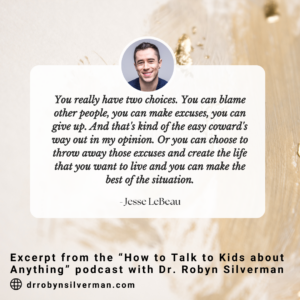 (Jesse LeBeau) So I really think it is finding that thing and it was trying a lot of different things before I found it. And then not being afraid to deviate from that dream a little bit and tweak it, and you might ultimately find something even better than you planned in the beginning.
(Jesse LeBeau) So I really think it is finding that thing and it was trying a lot of different things before I found it. And then not being afraid to deviate from that dream a little bit and tweak it, and you might ultimately find something even better than you planned in the beginning.- (Dr. Robyn Silverman) I was just talking about feeling like you’re falling short, that’s okay because falling short actually puts you ahead of the game in a completely different area.
- (Jesse LeBeau) You really have two choices. You can blame other people, you can make excuses, you can give up. And that’s kind of the easy coward’s way out in my opinion. Or you can choose to throw away those excuses and create the life that you want to live and you can make the best of the situation. What now what, what can I do now? So the attitude piece is such a huge one, and it’s one that was life changing for me in various stages in my life.
- (Jesse LeBeau) So it’s one of those things where I think that the best thing that you can do is just work your tail off. It’s not glamorous. It’s not the fun answer. It’s not the shortcut to the front of the line. But it really comes down to this that no one can do your push ups for you. I love that quote. And the harder you work, the luckier you get. So I think you just kind of gotta roll up your sleeves and go, all right, how bad do I want to do this thing and pay your dues.
- (Dr. Robyn Silverman) We can’t give somebody confidence. We can’t praise our way into confidence. We have to do the work, we have to pay the pay the dues, we’ve gotta do the time.
- (Dr. Robyn Silverman) That confidence comes from repetitively doing the thing that we want to be gifted at. Gifts usually aren’t just handed out, left, right, and sideways. We develop our gifts, we develop our strengths. Sometimes we don’t even know that we can have a strength because again, we’re the underdog, but we can develop that strength by working hard. And I truly appreciate that.
- (Jesse LeBeau) So know that you have something and you love, but also know that your self respect is more important than any of those things.
- (Jesse LeBeau) I believed wholeheartedly with all of my heart that if I hadn’t chose to forgive this coach, that I would’ve let that anger inside of me cloud the opportunities in front of me, and I would’ve not been in the position I am today. So boundaries, self-respect, choose happiness, and at the end of the day, you can move on. Forgive, and maybe something great will come.
- (Jesse LeBeau) Another thing you can do is find a buddy that will hold you accountable. So here’s the big goal, break it into some smaller steps, and then have you and your friend group hold each other to that. Alright, what did you do this week? What did you do this month? How much further are you along? Because if you don’t have those awesome relationships in your life, then you probably don’t have much of a life anyways. And so getting those people that are your tribe and your team makes all the difference.
- (Dr. Robyn Silverman) he definitions that other people put on us can hold us back. But if we redefine ourselves or we have young adults in our lives that help us to redefine ourselves, we can take steps forward. So when you’ve been told a long time that you’re not good enough, you don’t have what it takes, how were you able to then either redefine yourself or repel what other people were saying, the negatives and still maintain a definition of yourself. I am capable, I am enough, whatever your I am statement is so that you could take a step forward in the direction of your dreams.
- (Jesse LeBeau) lThe most powerful thing you can do is start with yourself and become the best version of you and work on all those things that we all have to work on. You know, our tempers, our relationships, our relationship with our phone. You can’t yell at your kid about being on their phone too much if then you’re on your phone all the time. So it starts with you.
- (Dr.Robyn Silverman) As I often say you know, you have to have do-overs and sometimes we mess up and we give ourselves grace and we try again, and we get better and better just as what we would wish for our kids. The mistakes we make, we can see them as learning opportunities.
- (Jesse LeBeau) I think one of the most powerful things is when you make mistakes in front of them. Have that conversation of like, look, I messed up and look, this is hard, but I’m gonna try better and to be that living example
Resources:
- Website: www.jesselebeau.com
- Books:
- Among The Giants: Companion Work Book (2017)
- Among The Giants: How One Underdog Pursued His Dreams & You Can Too! (2014)
- YouTube: https://www.youtube.com/channel/UC5uw99zoDpcbs9I96N5jG9A
- LinkedIn: https://www.linkedin.com/in/jesse-lebeau-243b4636/
- Amazon: https://www.amazon.com/Jesse-LeBeau/e/B00JWRYSHS
- Facebook: www.facebook.com/JesseLeBeauPage/
- Instagram: https://www.instagram.com/jesselebeau/?hl=en
- Twitter: https://twitter.com/JesseLeBeau/status/1732480003445846220

